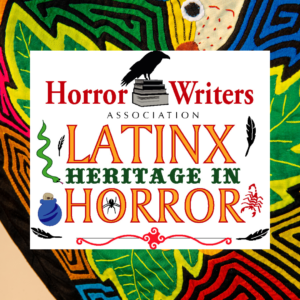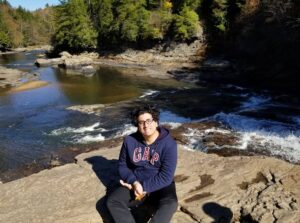
 Kevin (he/they) is a gay, Latine fiction writer, and cardiovascular research scientist. His fiction work appears (or forthcoming) in Idle Ink, Medusa Tales Magazine, Pyre Magazine, and more. He is Editor/Publisher of Tree and Stone Magazine, an HWA/SFWA/Codex member, and First Reader for Interstellar Flight Press. For more about him, please see his website: https://kevinmcasin.wordpress.com/. Please follow his Twitter: @kevinthedruid.
Kevin (he/they) is a gay, Latine fiction writer, and cardiovascular research scientist. His fiction work appears (or forthcoming) in Idle Ink, Medusa Tales Magazine, Pyre Magazine, and more. He is Editor/Publisher of Tree and Stone Magazine, an HWA/SFWA/Codex member, and First Reader for Interstellar Flight Press. For more about him, please see his website: https://kevinmcasin.wordpress.com/. Please follow his Twitter: @kevinthedruid.
Latine Statement
I fully and completely respect my fellow latine who identify as latinX. This is statement is about my choice to use latine and shed light on this very important and vibrant debate around the term “LatinX”. I think this discourse is beautifully expressed in a wonderful essay published in the New York Times by Evan Odegard Pereira.
I most identify with the terms “hispanic” or “latino”, but I have recently adopted the term LatinE (“e” capitalized for emphasis). “Latine” is gender-inclusive and honors our language and culture, while–I believe–respecting the work of those who fought for Latino/Latina. For more information about using the term “latine”, please visit the website of Call me Latine.
What inspired you to start writing?
I’ve always loved coming up with stories. My favorite thing to do as a kid was play as a villain when I played pretend with my cousins. It wasn’t until high school, when I read the allegorical novel “Out of the Silent Planet” by C.S. Lewis, and I was so fascinated by the story I wondered if I could do the same. So I came up with characters, made them walk down a road—similar to the Lewis story—and had them interact with people or things with meaning behind them, like my teacher had told me allegories did. I shared it with my best friend, at the time, and she said she liked it. So, my life as a writer began.
What was it about the horror genre that drew you to it?
Horror was my introduction into secondary world-building. I loved the fantasy aspect, where you could invent a magical character to evoke fear from someone, like Freddy Kruger, who could come into dreams and terrorize children, or Pennywise–a murderous, demon clown. Of course, this could never happen, but it was removed from reality enough that seemed plausible. And again, I tried to copy Wes Craven and Stephen King. I let my imagination run wild, created a town like Derry–I called mine Blackwood–developed characters who had pretty graphic and gruesome deaths (I don’t know how I got away with it because it was not at all okay). But that I could invent an entire town, with people, lore, history, a whole world where near impossible things could happen was so enticing and I fell in love.
Do you make a conscious effort to include LatinX characters and themes in your writing and if so, what do you want to portray?
Always! I make sure to write, in some explicit way, that the character’s skin is brown or tanned, use Spanish words, or try to depict a setting I get from my few visits to my family in Colombia. Even if I’m describing an elf or an android, I make sure they represent the Latine or Latinx community in some way. I’m always looking for other more inventive ways too.
AND my characters are always queer–rare exceptions do exist. All of my stories come from some experience I’ve had as a queer, Latine cis-gendered man, who grew up in Miami, FL, and Baltimore, MD.
What has writing horror taught you about the world and yourself?
Haruki Murakami is one of my favorite authors. I read in a book called “Murakami’s Interviews: Collections of Haruki Murakami’s interviews, Studies and Thoughts” by Richard Cooper–which I can’t find anymore–he once said, “stories–effective stories, that is–can pinpoint where a wound lies, define its boundaries…and work to heal it”.
Horror writing taught me where those boundaries lie. Like many queer kids, high school was very hard, especially in a conservative christian school, where students frequently expelled for being queer. I managed, somehow, to get away with hiding my sexuality. In that dark place, the lonely quiet, my writing helped me imagine worlds where I could express my frustration. As I got older, I put those memories into the stories, unpacked them, and got the chance to heal. In horor–the type I like–there’s always hope and all it takes is a few brave little choices, like putting words on paper and sending them to a magazine. It’s scary at first, but when you look back, you might be glad you did it.
How have you seen the horror genre change over the years? And how do you think it will continue to evolve?
Growing up, like so many, the only horror author I knew was Stephen King. I read some of his stories and watched the film adaptations. I would also watch classic horror movies, like Nightmare on Elm Street Friday the 13th. I’m not an expert on, or a historian of, horror, but I do think the genre is becoming more inclusive. Diverse characters and perspectives are flourishing and many are recognizing problematic comments in the classic works. It’s very important to acknowledge the problems. We don’t need to cancel them, but we should point to them and let others know, “this is not okay.” I’m excited to see what the future holds.
How do you feel the LatinX community has been represented thus far in the genre and what hopes do you have for representation in the genre going forward?
I think representation is increasing and that it terrific. I think we can always do more, especially to represent the queer LatinX experience. I always try to center my stories around my own experiences growing up in Miami. I’d love to read more of these stories.
Brief plug, a Tree and Stone Magazine I am planning a special issue (maybe series) for Latine literary and speculative fiction writers. Details coming soon, so follow us on Twitter/Instagram @treeandstonemag or our website https://www.tree-and-stone.com/!
Who are some of your favorite LatinX characters in horror?
None right now, but I’m open to reading more stories with wonderful LatinX characters! Please recommend and I’ll add them to my reading list!
Who are some LatinX horror authors you recommend our audience check out?
On my to-read list are Gabino Iglesias and Pedro Iniguez.
What is one piece of advice you would give horror authors today?
Rejection is very hard! It’s okay to step away from submitting, writing, querying, and to take care of yourself, but I encourage you to come back and keep trying, keep coming up with new stories, and keep learning your craft. Stories and even writers have to find their people. Trust the stories will find their people and they will love it.
And to the LatinX writers out there who are just getting started, what advice would you give them?
I spent so much time following rules, because I believe we are taught, in all aspects of our life, to follow rules. Rules and laws are important! Of course! But in writing, I believe its essential to remember there are no rules, only tools and guidelines. I encourage new writers (I still consider myself one) to learn the pros, cons, and the whys of “the rule”. Maybe even break them in a story. Try writing an entire story of pure exposition (telling), you may find you can tell it in a really compelling way. Just try it! Turn the rules into guidelines, and you’ll be okay.
One more, if I may, find fellow writers who genuinely want to support you. I’m always hoping to help and support a fellow writer, so you’re welcome to reach out and I’ll do my best.
Links cited above:
https://www.nytimes.com/2021/06/15/learning/for-most-latinos-latinx-does-not-mark-the-spot.html

